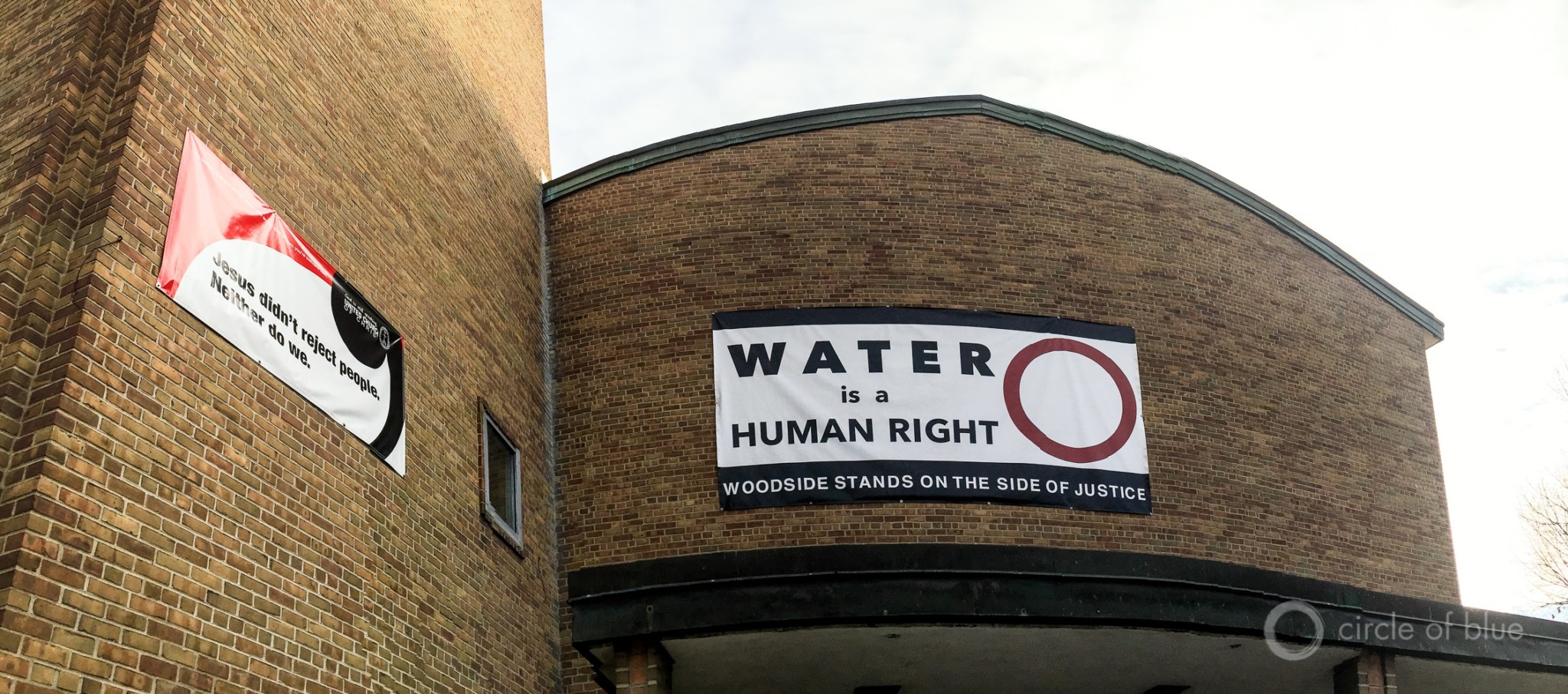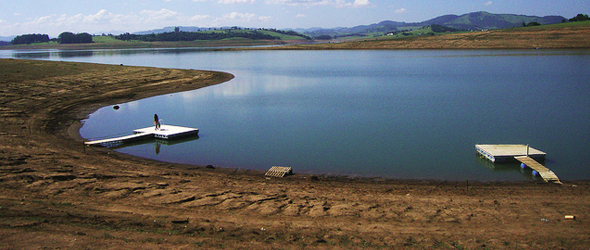Michigan Lawmakers Regroup in Human Right to Water Effort
Republican support will be needed for the Democratic proposal.

A banner proclaiming that water is a human right hangs on the exterior of Woodside Church, in Flint, Michigan, in this photo from February 2016. Photo © J. Carl Ganter / Circle of Blue
By Brett Walton, Circle of Blue
Motivated by the Flint lead scandal and Detroit water shutoffs — events that heightened public and political attention to water policy — lawmakers who represent those cities in the Michigan Legislature have revived their effort to pass a law recognizing a human right to clean water.
Sponsored by Sen. Coleman Young, a Democrat from Detroit, Senate bill 466 would confer to all individuals in the state a right to “safe, clean, affordable, and accessible water for human consumption, cooking, and sanitary purposes.” The wording of the bill is nearly identical to California’s human right to water law, which was signed five years ago this month and resulted in substantial changes in state policy and practice.
This is Young’s second attempt to pass the statute. SB 466, in its earlier incarnation, was part of a 10-bill legislative package related to water access, monitoring, affordability, and utility oversight that lawmakers introduced in the 2015-16 session. Only one of the ten bills — requiring water utilities to notify customers within 72 hours when lead levels exceed federal standards — was signed into law.
Lawmakers responded to the setback by redoubling their efforts, not only to pass a right to water but to address what they say are numerous deficiencies in Michigan’s approach to regulating and overseeing drinking water. More than two dozen water-related bills have been introduced in 2017, the first year of the two-year session.
In addition to SB 466, those bills include:
- SB 63, which lowers, by 2021, the concentration at which water utilities must take action on lead in drinking water to five parts per billion. The federal action level is 15 parts per billion.
- HB 4179, which allows the state to provide low-interest loans to local governments for replacing lead service lines.
- HB 4394, which requires the Michigan Department of Health and Human Services to establish a water affordability program that uses household income to set water bills for customers below 200 percent of the federal poverty line. The Philadelphia Water Department is the first big city in the United States to institute such a program for drinking water.
- HB 4392, which allows the Michigan Public Service Commission to regulate water rates for public and private water utilities.
Advocates and lawmakers acknowledge that they face an uphill climb to pass right-to-water legislation that is largely perceived as a Democratic approach to the question of water access. Both chambers of the Legislature, the governor’s mansion, and the state Supreme Court are controlled by Republicans.
Beyond party affiliation, Randy Block, director of the Michigan Unitarian Universalist Social Justice Network and an advocate for the human right to water, says that building regional coalitions will be necessary, too.
Block points out that none of the chairs of the Natural Resources Committee, Local Government Committee, or Government Operations committee represents Detroit or Flint — cities in which support for a human right to water bill is strongest. Most of the water-related bills have been filed in these committees, which are the first step in the legislative process. Lawmakers and advocates have appealed to the chairs to hold hearings on the bills.
“Progress depends on people outside these key cities,” Block said.
Rep. Stephanie Chang, a Democrat who represents Detroit, organized a hearing in June 2015 that set in motion the human right to water legislative package. She is the sponsor of the water affordability bill and several others.
Chang told Circle of Blue that she has not looked at how California lawmakers succeeded in their endeavor to pass a human right to water, but that Michigan is in a “different situation politically” with the composition of the Legislature.
A Conversation Starter
Block and Chang see potential for common ground in the report of a special committee convened by state lawmakers after the Flint water scandal. The goal of the six-person committee, chaired by Sen. Jim Stamas, a Republican, and comprised of state senators and representatives, was to make policy recommendations that could relieve the suffering in Flint and prevent future drinking water emergencies.
In reading the committee’s report, which was published in October 2016, Block could link seven or eight of the recommendations to water bills that were introduced this year.
“A bipartisan report from a Republican senator includes recommendations that are in the package,” he said. “That’s significant, but we have to keep reminding lawmakers. Solutions have been identified, we just need the political will to move them forward. We need to strengthen lawmakers’ backbones.”
Room for agreement does seem possible. Circle of Blue spoke with Rep. Ed Canfield, a Republican who represents Huron and Tuscola counties, both rural areas at the northern tip of Michigan’s “thumb,” which juts into Lake Huron. Communities in his district cope with the costs of maintaining aging pipes and with water tainted by sulfur that is a legacy of the region’s coal mining industry.
“If you could use the water, you could use it to wash clothes and that’s about it,” he remarked about one community.
Canfield, who was a member of the Legislature’s special committee on Flint, introduced a bill that would require towns to provide a public tap with safe water for families whose wells have gone sour. Though he is still sorting out the details of the plan, Canfield envisions a tap available at a fire department or municipal building. He acknowledges that it is a stopgap measure — “a third-world remedy for a first-world nation” — but he says that a short-term solution is urgent for people in cities and rural areas who need water now.
“It’s a conversation starter,” Canfield said about his bill. “I don’t have it fleshed out yet.”
About the idea of a human right to water, Canfield was open to discussion and even drew parallels with his public tap proposal.
“My water bill would provide access to all,” Canfield said. “In a sense that indicates that water is a human right and that we ought to provide availability.” Though governments have a duty to make water available, he said, he did not think that a right to water extends to providing water to all household taps.
Michigan’s veteran civil rights campaigners, meanwhile, applaud lawmakers for considering legal changes. But, from experience, they recognize that change does not come without a fight.
“To ask nicely has not gotten us anywhere,” Maureen Taylor, state chair of the Michigan Welfare Rights Organization, told Circle of Blue. Taylor’s organization is a member of the People’s Water Board, a Detroit collective that is a strong advocate for the human right to water bill and for ending water shut offs in the city.
“It’s an uphill struggle,” Taylor continued. “It’s going to take a long time. We’re going to have to get in the streets.”
Brett writes about agriculture, energy, infrastructure, and the politics and economics of water in the United States. He also writes the Federal Water Tap, Circle of Blue’s weekly digest of U.S. government water news. He is the winner of two Society of Environmental Journalists reporting awards, one of the top honors in American environmental journalism: first place for explanatory reporting for a series on septic system pollution in the United States(2016) and third place for beat reporting in a small market (2014). He received the Sierra Club’s Distinguished Service Award in 2018. Brett lives in Seattle, where he hikes the mountains and bakes pies. Contact Brett Walton










